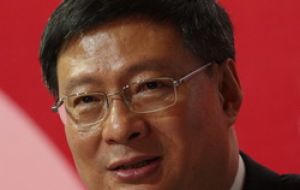MercoPress. South Atlantic News Agency
China lowers lending target; exporters demand “stable” Yuan
 Li Lihui, president of the Bank of China
Li Lihui, president of the Bank of China Bank of China will maintain a reasonable pace of lending this year, Li Lihui, the president of the country's fourth-largest lender by assets said on Wednesday.
Li told the official Xinhua news agency that Bank of China would pay particular attention to credit risk with a view to promoting the bank's long-term, sustainable growth.
His comments chime with the directives of the China Regulatory Banking Commission, which has lowered its 2010 lending target to about 7.5 trillion Yuan from a record 9.6 trillion Yuan last year, when banks rushed to pump up growth at the government's behest.
“In 2009 the pace of lending was not normal. It was meant to meet special demands in a special time of financial crisis” Xinhua paraphrased Li as saying.
The CBRC has repeatedly called on banks to lend at a more regular rhythm and to strengthen their risk management in order to prevent an increase in bad loans.
In related news exporters at Shanghai’s largest international trade fair said they can bear Yuan gains of little more than 2% this year, putting pressure on the central bank to limit appreciation sought by the US and Europe.
Persuading China to allow the Yuan to climb this year is one of US President Barack Obama’s stated goals and a group of 15 senators last week called for stiffer tariffs on imports from Asia’s second-largest economy, saying an undervalued currency gives Chinese exporters an unfair advantage.
China’s government is carrying out stress tests to gauge the effect appreciation would have on labor-intensive industries, the 21st Century Business Herald, a Guangzhou-based newspaper, reported Feb. 26.
The People’s Bank of China has kept the Yuan at about 6.83 versus the greenback since July 2008, halting a 21% three-year advance as a global recession battered exports. Most of China’s foreign trade is denominated in US dollars.
Chinese exports rose 21% in January from a year earlier after climbing in December for the first time in 14 months. A full recovery in China’s foreign trade will take another two to three years, Yao Jian, spokesman for the Ministry of Commerce, said Feb. 25.
“We aren’t optimistic about the domestic environment this year as the cost of raw materials has jumped 30% for textile companies,” said Huang Jinlan, chairman of Jiangsu Guotai International Group Co., the third-biggest exporter in the eastern province of Jiangsu. Yuan appreciation should not exceed 1.5%, he added.
Wage increases are also limiting exporters’ ability to cope with a stronger currency. The average earnings of workers in China’s towns and cities totaled 21,984 Yuan (3,220 USD) in the first nine months of last year, 12% higher than in the same period of 2008.
Chinese migrant workers are expecting an average 14% increase in salaries this year, the official Xinhua News Agency said on Feb. 24, citing a report from the Ministry of Human Resources and Social Security. Producer prices climbed 4.3% from a year earlier in January, after posting the first increase of 2009 in December.
The People’s Bank of China reiterated a pledge to keep the currency “basically stable” in its quarterly monetary policy report on Feb. 11.




Top Comments
Disclaimer & comment rulesCommenting for this story is now closed.
If you have a Facebook account, become a fan and comment on our Facebook Page!